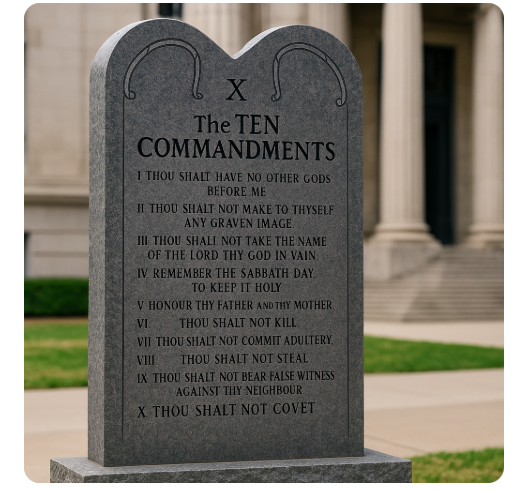Federal Appeals Court Strikes Down Louisiana Ten Commandments Law
A panel of federal judges has ruled against a Louisiana law mandating the display of the Ten Commandments in public school classrooms, labeling the legislation unconstitutional and sparking sharp criticism from Christian leaders and conservative legal scholars. The decision, handed down by the U.S. Court of Appeals for the Fifth Circuit, marks yet another chapter in the decades-long conflict between public religious expression and secular legal activism.
The law in question, known as HB 71, was passed by Louisiana’s Republican-led legislature in 2024 and signed into law by Governor Jeff Landry. It required all K-12 public school classrooms to post a copy of the Ten Commandments in “large, easily readable font” by the beginning of the 2025-2026 school year. The text was to be printed on a poster measuring at least 11 inches by 14 inches and displayed in a “prominent” location in each room.
Supporters of the measure, including Governor Landry, argued that the Ten Commandments are not only religious principles but also foundational to the moral and legal framework of Western civilization—and, by extension, American law. “If we want our children to respect the rule of law,” Landry said during a press conference earlier this year, “we should start by teaching them where that law came from.”
But the Fifth Circuit Court disagreed, citing the Establishment Clause of the First Amendment. In its ruling, the court stated that the law had “a primary religious purpose” and thus amounted to an unconstitutional endorsement of religion by the state. The court argued that the measure failed to pass the long-standing Lemon v. Kurtzman test, a three-pronged legal standard used to evaluate whether government actions violate the Establishment Clause.
Judge Stephen Higginson, writing for the majority, noted that the required classroom displays would “inevitably convey a message of religious endorsement,” and that “the state may not favor one faith tradition over others under the U.S. Constitution.” The court’s ruling effectively blocks the law’s implementation ahead of the upcoming school year, pending appeal.
Reaction from conservative circles was swift and pointed. Critics of the ruling argue that the court’s decision undermines the historical and cultural relevance of the Ten Commandments and reflects a growing hostility toward Christian values in public life. “The Constitution was never meant to be stripped of all references to God,” said Mat Staver, founder of Liberty Counsel, a Christian legal organization. “The Ten Commandments are not only religious—they’re historical. This ruling is a clear example of judicial activism at odds with America’s founding.”
The ruling also drew condemnation from parents’ groups and Christian education advocates, who see it as yet another example of the courts overruling the will of the people. According to a 2024 Gallup poll, 63% of Americans supported allowing the Ten Commandments to be displayed in public schools, a figure that jumps to 82% among self-identified Christians.
“This is what happens when activist judges ignore the people and bend the Constitution to fit secular agendas,” said one parent from Baton Rouge. “We’re not asking for our kids to be indoctrinated—we just want them to know right from wrong, and the Ten Commandments provide that clarity.”
Proponents of HB 71 also noted that the law allowed for contextualization, requiring a historical note to be included on the posters explaining the Commandments’ influence on U.S. legal codes. However, the appeals court brushed aside this provision, calling it an insufficient safeguard against religious favoritism.
Governor Landry indicated that the state would appeal the decision to the Supreme Court. “We will not be intimidated by those who want to erase our heritage,” he said in a statement. “The Ten Commandments are not just a religious document; they are the bedrock of our legal system, and the people of Louisiana have every right to acknowledge that in our schools.”
Some legal analysts believe the case could indeed end up before the Supreme Court, where a conservative majority might be more sympathetic to arguments about the historical role of religion in American public life. The Court’s recent rulings in favor of religious liberty—such as Kennedy v. Bremerton School District, which upheld a football coach’s right to pray on the field—suggest the possibility of a more favorable outcome for supporters of HB 71.
Critics of the ruling also point to perceived double standards in the judicial system, noting that progressive ideologies are routinely promoted in public school settings without legal challenge. “It’s okay to plaster classrooms with Pride flags and radical gender theory posters, but the Ten Commandments are somehow a bridge too far?” asked one local pastor. “This is less about neutrality and more about silencing Christian influence.”
The ruling reflects an ongoing cultural tug-of-war over the role of religion in the public square. As America becomes more polarized, the courtroom continues to serve as the battlefield for issues of faith, education, and morality. For many Christian conservatives, this case represents not just a legal setback, but a clarion call to defend the nation’s spiritual heritage against what they view as increasing secular encroachment.
Governor Landry has vowed to continue the fight. “This is about our children and our future,” he said. “And we will not retreat from the truth.”

